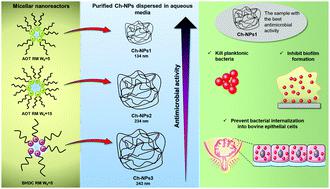当前位置:
X-MOL 学术
›
Soft Matter
›
论文详情
Our official English website, www.x-mol.net, welcomes your feedback! (Note: you will need to create a separate account there.)
A comparative study of antimicrobial activity of differently-synthesized chitosan nanoparticles against bovine mastitis pathogens
Soft Matter ( IF 3.4 ) Pub Date : 2020-11-06 , DOI: 10.1039/d0sm01179g M Soledad Orellano 1 , Luciana P Bohl 2 , María L Breser 2 , Paula Isaac 2 , R Darío Falcone 3 , Carina Porporatto 2
Soft Matter ( IF 3.4 ) Pub Date : 2020-11-06 , DOI: 10.1039/d0sm01179g M Soledad Orellano 1 , Luciana P Bohl 2 , María L Breser 2 , Paula Isaac 2 , R Darío Falcone 3 , Carina Porporatto 2
Affiliation

|
The greatest concern in dairy farming nowadays is bovine mastitis (BM), which results mainly from bacterial colonization of the mammary gland. Antibiotics are the most widely used strategy for its prevention and treatment, but overuse has led to growing antimicrobial resistance. Pathogens have also developed other mechanisms to persist in the udder, such as biofilm formation and internalization into bovine epithelial cells. New therapies are therefore needed to reduce or replace antibiotic therapies. In a previous study, we found that chitosan nanoparticles (Ch-NPs) have considerable potential for the treatment of BM. The aim of the present study was to evaluate the antimicrobial activity of differently-synthesized Ch-NPs against BM pathogens and their toxicity in bovine cells in vitro, to further explore the attributes of Ch-NPs for the prevention and treatment of intramammary infections. We also looked into their ability to inhibit biofilm formation and prevent the internalization of S. aureus into mammary epithelial cells. Finally, since an interesting approach for BM prevention is to enhance the host's immune response, we studied whether Ch-NPs could promote the release of pro-inflammatory cytokines in mammary epithelial cells. The results reveal that the bactericidal effect of Ch-NPs on BM pathogens and their ability to inhibit biofilm formation are size-dependent, with smaller particles being more efficient. In contrast, their effect on the viability of the cell lines is not size-dependent and all samples tested were non-toxic. The smallest Ch-NPs successfully prevented the internalization of S. aureus into the cells, but did not promote the production of pro-inflammatory cytokines. These findings make it possible to conclude that Ch-NPs are a great bactericidal agent which can prevent the main mechanisms developed by BM pathogens to persist in the udder.
中文翻译:

不同合成的壳聚糖纳米粒对牛乳腺炎病原菌抗菌活性的比较研究
当今奶牛养殖中最大的担忧是牛乳腺炎(BM),它主要是由乳腺的细菌定植引起的。抗生素是其预防和治疗最广泛使用的策略,但过度使用导致抗菌素耐药性不断增加。病原体还发展出其他机制在乳房中持续存在,例如生物膜形成和内化到牛上皮细胞中。因此需要新的疗法来减少或替代抗生素疗法。在之前的一项研究中,我们发现壳聚糖纳米颗粒 (Ch-NPs) 在治疗 BM 方面具有相当大的潜力。本研究的目的是评估不同合成的 Ch-NPs 对 BM 病原体的抗菌活性及其在体外牛细胞中的毒性。, 进一步探索 Ch-NPs 预防和治疗乳房内感染的属性。我们还研究了它们抑制生物膜形成和防止金黄色葡萄球菌内化的能力进入乳腺上皮细胞。最后,由于一种有趣的 BM 预防方法是增强宿主的免疫反应,我们研究了 Ch-NPs 是否可以促进乳腺上皮细胞中促炎细胞因子的释放。结果表明,Ch-NPs 对 BM 病原体的杀菌作用及其抑制生物膜形成的能力取决于尺寸,较小的颗粒更有效。相反,它们对细胞系活力的影响不依赖于大小,并且所有测试的样品都是无毒的。最小的 Ch-NPs 成功地阻止了金黄色葡萄球菌的内化进入细胞,但不促进促炎细胞因子的产生。这些发现可以得出结论,Ch-NPs 是一种很好的杀菌剂,可以阻止 BM 病原体发展的主要机制在乳房中持续存在。
更新日期:2020-11-21
中文翻译:

不同合成的壳聚糖纳米粒对牛乳腺炎病原菌抗菌活性的比较研究
当今奶牛养殖中最大的担忧是牛乳腺炎(BM),它主要是由乳腺的细菌定植引起的。抗生素是其预防和治疗最广泛使用的策略,但过度使用导致抗菌素耐药性不断增加。病原体还发展出其他机制在乳房中持续存在,例如生物膜形成和内化到牛上皮细胞中。因此需要新的疗法来减少或替代抗生素疗法。在之前的一项研究中,我们发现壳聚糖纳米颗粒 (Ch-NPs) 在治疗 BM 方面具有相当大的潜力。本研究的目的是评估不同合成的 Ch-NPs 对 BM 病原体的抗菌活性及其在体外牛细胞中的毒性。, 进一步探索 Ch-NPs 预防和治疗乳房内感染的属性。我们还研究了它们抑制生物膜形成和防止金黄色葡萄球菌内化的能力进入乳腺上皮细胞。最后,由于一种有趣的 BM 预防方法是增强宿主的免疫反应,我们研究了 Ch-NPs 是否可以促进乳腺上皮细胞中促炎细胞因子的释放。结果表明,Ch-NPs 对 BM 病原体的杀菌作用及其抑制生物膜形成的能力取决于尺寸,较小的颗粒更有效。相反,它们对细胞系活力的影响不依赖于大小,并且所有测试的样品都是无毒的。最小的 Ch-NPs 成功地阻止了金黄色葡萄球菌的内化进入细胞,但不促进促炎细胞因子的产生。这些发现可以得出结论,Ch-NPs 是一种很好的杀菌剂,可以阻止 BM 病原体发展的主要机制在乳房中持续存在。



























 京公网安备 11010802027423号
京公网安备 11010802027423号